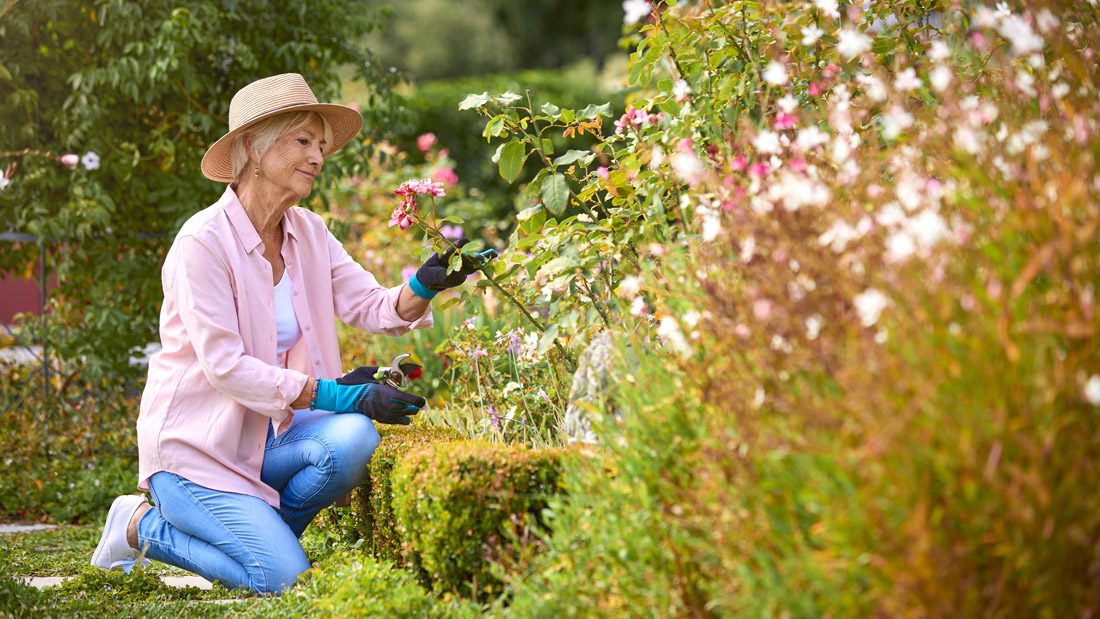Becoming a certified master gardener offers opportunities to be in nature and give back to your community!

Kelly Spetalnick, a retired optometrist who lives in Sandy Springs, holds the title of certified master gardener. But she’s not a landscaper or professional gardener. Rather, she’s a community-minded nature lover who wanted to give back.
Spetalnick received the designation through the Georgia Master Gardener Extension Volunteer program, available across the state through UGA’s County Extension Offices. Its goal is to educate residents about how to utilize plants and gardening to improve their surroundings and enrich both their lives and the lives of others. “When I meet new folks who carry the label, I instantly feel a bond through a shared love of nature and learning,” Spetalnick says.
Spetalnick became a master gardener in 2018. She loved the outdoors and had been growing vegetables and herbs for years when a friend who’s a horticultural therapist told her about the program. “The key aspect for any UGA master gardener is community service and education to the public,” she says. “It’s not just a source of learning.”
One of the most memorable projects Spetalnick has worked on since joining the program involved designing a garden for the visually impaired, something a UGA extension agent suggested after learning she was an optometrist. Spetalnick installed the garden and recorded an audio tour, had QR code and braille signs made for each plant and taught a weekly after-school class for 5- to 18-year-olds.
Brookhaven resident Sarah Brodd, a UGA extension agent who oversees the DeKalb County Master Gardener program, says it’s important to keep in mind that while it is a certification, the heart of it is a volunteer program. Applicants receive 12 weeks of training on everything from pest management to plant and tree identification, and are then required to complete a set number of volunteer hours each year. For example, that might be tending a vegetable bed that supplies carrots, tomatoes and other items to a local food pantry. Or it could be adding signage along a trail identifying different plants or giving guided nature tours to kids. “The master gardener program has become a part of my identity, filling a hole I didn’t know was there,” Spetalnick says. “Like most things, the more you give, the more you get.”

How to Become a Master Gardener
The Georgia Master Gardener Extension Volunteer program is run through UGA’s County Extension Offices, so to get started, find your county office by visiting extension.uga.edu/county-offices.
You’ll then apply for the Master Gardener Extension Volunteer horticultural training, a process that takes place several months prior to the training and is typically held in spring or fall. A fee of around $200 includes several weeks of classroom training (during which participants must pass a midterm and final exam) and a master gardener handbook.
To be accepted, fill out a questionnaire regarding your previous gardening experience and why you’re interested in becoming a master gardener. Share your goals via a plan of action or a written essay. Since master gardeners occasionally work with children, you’ll have to be vetted by a background check. In some counties, you’ll have a face-to- face interview with county agents and current master gardeners.
Prospective volunteers must complete 50 hours of service on extension approved projects in their home counties. Each subsequent year, they’re required to complete at least 25 hours.
After becoming certified, you’ll receive access to UGA’s research material, online learning opportunities and other resources.
For more information, go to the Frequently Asked Questions page of the Georgia Master Gardener program website.
Award-winning writer and editor who has penned stories for CNN, Woman's Day, Good Housekeeping, and dozens of other outlets.











